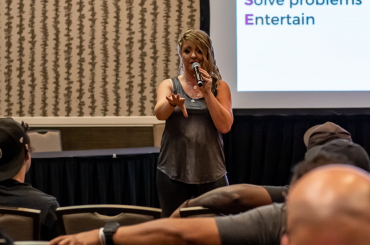All businesses feel the occasional sting of getting stiffed on payment from a client. But if your business is constantly feeling cash pressure, or you’re always under-capitalized, you might have a collection problem. The good news is that your collection problem is rooted in the fact that you have a sales problem, and that can be remedied.
Many DJ businesses, like many service businesses—especially those just starting out—have a collection procedure that’s based on either emergency or urgency. You need to get in front of that, because we all know how important cash flow is to a young company. And when you’re not on top of accounts receivable, unfulfilled remittances have a way of piling up, which fuels anxiety and can rob you of being your best the day of the gig.
We all know the obvious—get all payment terms in a written contract, specifying deposit amount and consequences for non-payment. Still, there are times when you’ll get stiffed. Tom Woodcock, owner of Seal the Deal sales consultancy in St. Louis, knows this all too well. A former salesman in the construction-equipment industry, he’s been advising small businesses for more than decade about best practices in marketing and closing deals, and he’s seen the non-payment pain first-hand.
He outlines the following steps that you can take at the beginning of every client relationship that can mitigate any collection problems later on.
Develop a relationship with the customer to establish the parameters: “You need to work the sales process through the whole transaction,” says Woodcock. “When you meet your customers face-to-face early on, ask them: ‘Payment can be an issue in the service industry, it happens all the time. What’s the procedure you want me to follow to make sure you’re getting the information you need so we don’t have a payment situation on the back side?’”
When a customer responds to this at the beginning of your interaction, says Woodcock, before you have a transaction, “the customer is taking responsibility for that action.”
Woodcock says even though your payment procedure is clearly stated in your contract, the articulation of this is a crucial element to the relationship. It’s an airing out before anything “gets weird.”
Don’t be slow on the draw: Some DJs and service providers can be slow on their billing, and can be equally slow to respond to non-payment. This is a frequent problem among DJ business startups that don’t have administrative help. Specify in your contract what the terms of payment are. “You’ve got 30-day terms? Reach out on Day 31,” says Woodcock. “Ten-day terms? Reach out on Day 11. Do not vary from that.”
Maintain the same persona: Be the same person you always have been, advises Woodcock. “It’s important that your demeanor is consistent, the same as when you are trying to collect as when you were trying to get the business in the first place,” he says. This way you don’t appear desperate or angry, which can exacerbate a non-payment issue.
Always contact the client by phone, not email. “Just like any contact in sales, face-to-face, voice to voice, is best,” says Woodcock, who notes that e-mails are easy to ignore. “Look, we know that we all hate to get calls, and we all hate to be called and hassled when any payment is due. So if we hate to be called and we hate to make the calls, if you have procedures in place that your customer can get used to, they won’t be getting those calls, but they’re consistently being contacted in a way that’s easy for them to digest.”
Some DJs recommend a registered letter as a replacement tactic for email. Woodcock doesn’t agree. “Pick up the phone—a letter is just as easy to ignore as an email.”
Come from a position of trust, not mistrust: “Mistrust can easily be read in your voice,” says Woodcock. “If non-payment becomes an issue, trust that it’s initially a paperwork error, or an employee that’s dropped the ball. Whatever the client’s first excuse is, trust it. Say you know how that situation can be. Then tell the client there’s something here that needs to be solved, and the sooner the better.”
Dismiss the old saying: “Nice guys finish last” is not necessarily true in the sales dynamic. “By crossing your T’s and dotting your I’s, the day the payment’s not in, put a procedure in place—a pleasant, easygoing friendly outreach to start the collection process. It’s the consistency of the contact and the way you contact them. A little bit of sugar gets a lot of results.”








